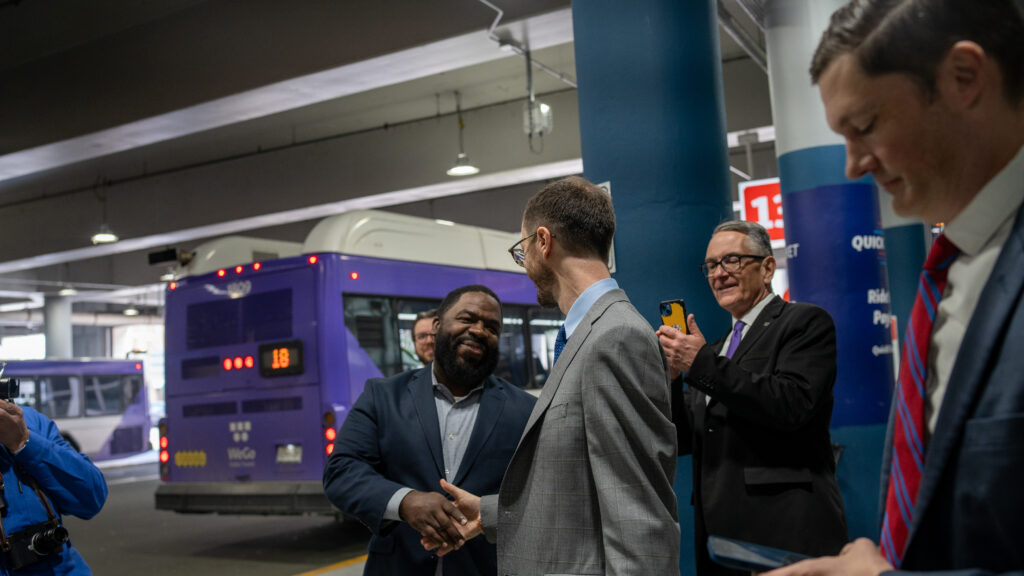
Last week’s announcement by Nashville Mayor Freddie O’Connell answered a question that many have been asking for months: Will he pursue a transit referendum this year?
While voters now know the answer is yes — it will be on the Nov. 5 ballot — they don’t know much more than that. This is intentional. Before any specific changes to bus routes, roadways, traffic signals or sidewalks are spelled out, O’Connell wants the city to be involved.
The details of the referendum, called “Choose How You Move – An All-Access Pass to Sidewalks, Signals, Service, and Safety,” are to be hammered out over a six-week period that will center public feedback.
“We’re not releasing a map or unveiling a plan — we’re pressing the ‘go’ button on a process to give voters the best choice,” O’Connell said Thursday.
Advisory committees
That process kicked off immediately after the announcement. O’Connell went by bus to a meeting with the community advisory committee, who have been tasked with ensuring the plan’s contents speak to what Nashvillians actually want — and that the details are communicated clearly to voters.
The community group is one of two committees helping craft the proposal. The other, a technical advisory committee, will vet projects and see that they are addressing “walkability, connectivity and transportation efficiency” across the city.
Both committees are expected to meet four times between now and May.
Metro Council collaboration
The mayor says that he also hopes to center the opinions of Nashville’s Metro Council.
It’s an attempt to avoid the resounding failure of the city’s last (and only) referendum. When “Let’s Move Nashville” hit voters’ ballots in 2018, O’Connell was serving as the District 19 council member. He told WPLN he felt there was a lack of collaboration with the body.
“I don’t know that this didn’t happen across the board fully, but I will say there wasn’t a lot of engagement directly with me in the previous process,” O’Connell said. “And I think that’s actually a lesson learned, too, that Metro Council should be engaged. We will be engaging them. We should actually allow quite a bit of community input to reinforce this.”
O’Connell said he would be inviting all 40 council members to participate in “deep dives” with Metro’s transportation planning team.
Before it reaches voters, the plan will be subject to Metro Council approval. It will reach the chambers later this year, after it undergoes a financial audit in late March.
IMPROVE Act specifics
That financial audit is a requirement of the IMPROVE Act — the law that says local governments are permitted to devote a portion of taxes to specifically fund transit if approved by voters in a referendum.
The city has yet to decide which types of taxes will be funneled toward this plan. Under the law, there are six options:
- Sales tax
- Hotel/motel tax
- Business privilege tax
- Residential development fee
- Local car rental tax
- Motor vehicle/wheel tax
The type of (or types) will go directly toward funding what is outlined in the proposal, paying for everything from planning transportation projects to building and maintaining them for decades.
Public engagement, past and future
At Thursday’s press conference, O’Connell acknowledged the tight timeline before Nov. 5, but pointed out that there is already a decade of existing studies to draw upon.
“Nashville has conducted more than 70 plans and studies, that tens of thousands of Nashvillians — more than 65,000 — have contributed to and given input on,” O’Connell said. “In the coming weeks, we’ll have pulled the best of these ideas into a plan that delivers on Nashville’s most pressing transportation needs. It’s time to get to work.”
And, the work won’t stop there. O’Connell told WPLN that community engagement and public will be important, even beyond the referendum.
“Once we get past November — and hopefully we get a ‘yes’ vote on this — those conversations will continue even after that,” O’Connell said. “As we start to develop corridors, there are going to be plenty of opportunities for people to tell us what kind of quality they want to see for the trade offs that we’ll still need to think about.”

